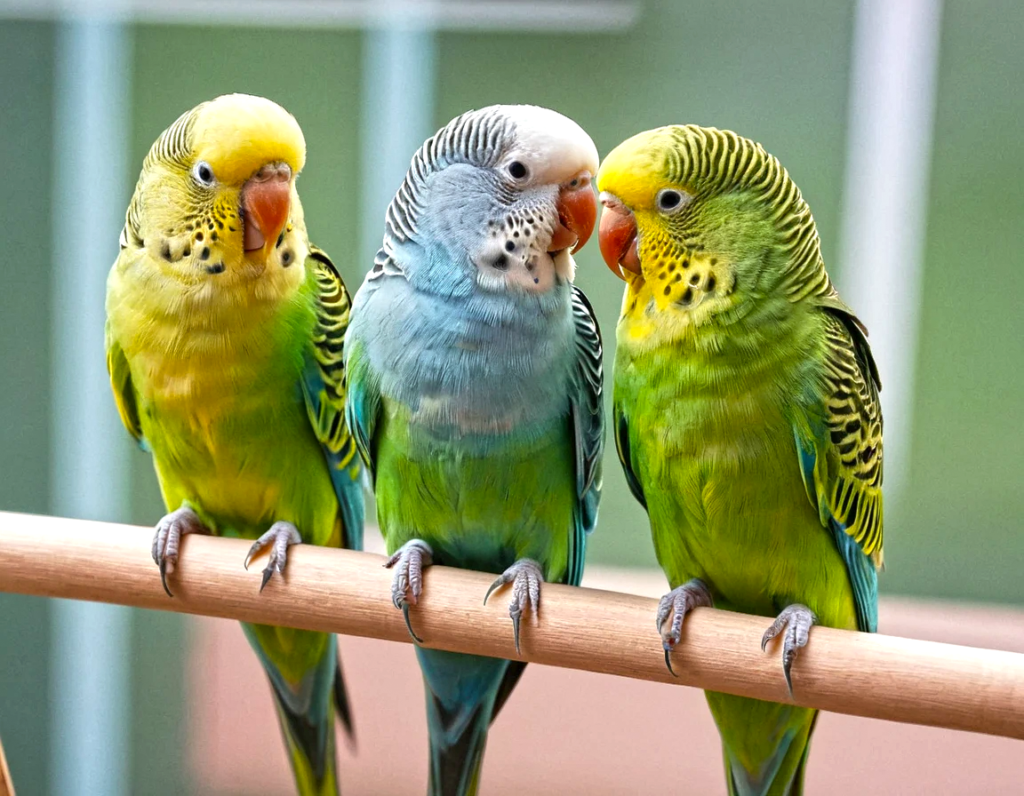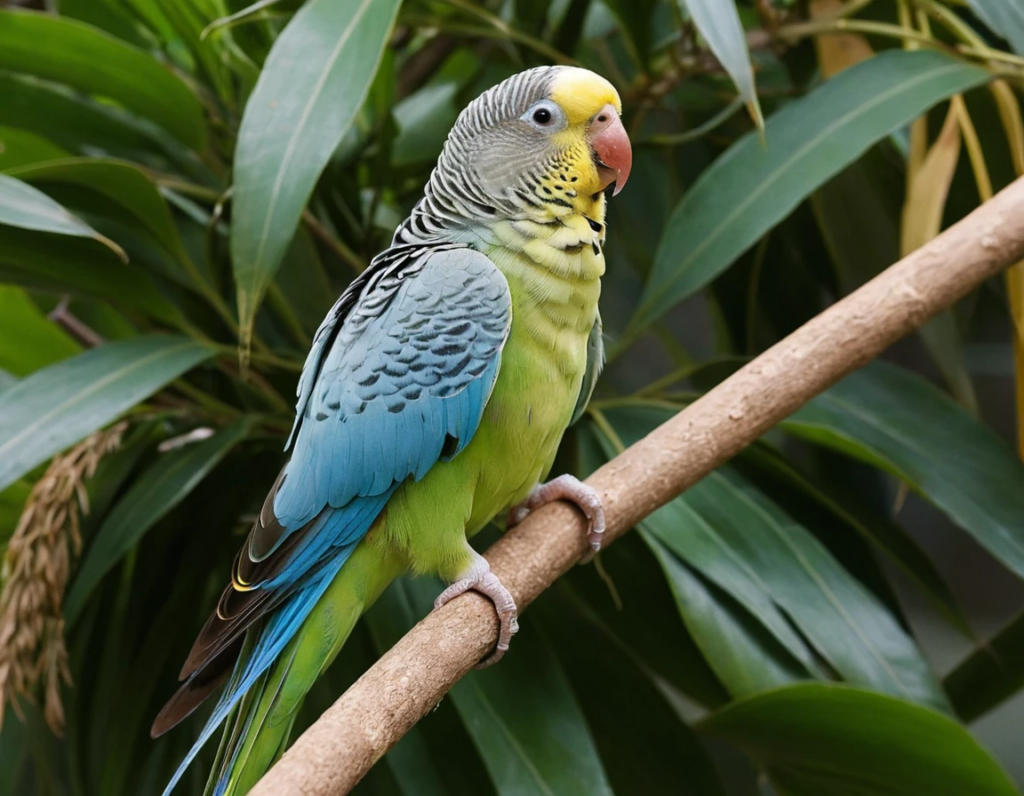
Why is my parakeet plucking its feathers?
So, you wake up one morning, look at your parakeet, and—oh no! Feathers everywhere. It looks like a tiny pillow fight happened in the cage overnight. If you’re wondering why your bird is suddenly obsessed with removing its own parakeet feather collection, don’t worry—you’re not alone. Let’s go over the most common reasons for this feathery crisis and what you can do about it.
Boredom – Yes, Even Birds Get Bored!
Parakeets are intelligent little creatures. If they don’t have enough to do, they might resort to feather plucking just for entertainment. Imagine being stuck in a room with nothing but a wall to stare at—you might start pulling your hair out too!
Solution:
- Get new toys and rotate them regularly.
- Spend more time interacting with your bird.
- Consider a bird buddy if your parakeet seems lonely.
Stress – Parakeets Have Drama Too
Parakeets are sensitive souls. A sudden change, like moving the cage, a new pet, or even loud noises, can stress them out. And when they stress, they pluck.
Solution:
- Keep their environment calm and predictable.
- Avoid placing their cage in high-traffic or noisy areas.
- Introduce changes gradually—parakeets don’t like surprises!
Poor Diet – Junk Food Isn’t Just Bad for Humans
If your parakeet isn’t getting the right nutrients, its feathers (and skin) can suffer. A bad diet leads to itchy, irritated skin, making your bird want to pluck out every parakeet feather in sight.
Solution:
- Offer a balanced diet of fresh fruits, vegetables, and high-quality pellets.
- Limit seeds—they’re tasty but not enough for proper nutrition.
- Make sure fresh water is always available.
Mites – The Tiny, Invisible Villains
If your parakeet is plucking excessively and also scratching, mites might be the culprit. These tiny pests love hiding in feathers and making life miserable.
Solution:
- Look for signs of mites—red or irritated skin, excessive scratching.
- Clean the cage regularly and replace bedding.
- If you suspect mites, consult an avian vet for treatment.
Health Issues – Sometimes, It’s More Than a Bad Habit
Feather plucking can be a symptom of an underlying medical condition like skin infections, allergies, or even hormonal imbalances.
Solution:
- If plucking continues despite changes in diet and environment, visit an avian vet.
- Rule out medical conditions before assuming it’s just stress or boredom.
Final Thoughts – Keep Your Parakeet Feather-Fluffy!
Parakeet feather plucking can be frustrating, but with the right approach, you can help your bird regain its feathery glory. Keep them entertained, well-fed, stress-free, and showered with love. And if all else fails, just remind them that going bald isn’t exactly trendy in the bird world!
How to Stop Parakeet Feather Plucking Naturally
So, your parakeet has decided that feathers are optional and is slowly turning into a tiny, naked dinosaur? Don’t worry—you’re not alone! Feather plucking is a common problem, but the good news is that there are natural ways to help your little buddy get back to their fluffy self.
1. Keep Your Parakeet Entertained – No More Birdie Boredom!
A bored parakeet is a plucking parakeet. If they don’t have enough to do, they might start yanking out their feathers just to pass the time. Imagine being stuck in a room with nothing to do—eventually, you might start pulling your hair out too!
Solution:
- Get a variety of toys (chewable, interactive, foraging) to keep them busy.
- Play music or leave the TV on for background noise.
- Spend quality time with them—yes, they like gossiping too!
- Consider a parakeet buddy if they seem lonely.
2. Reduce Stress – Even Birds Need a Chill Zone
Parakeets are sensitive little creatures, and stress can lead to serious feather-plucking habits. A loud environment, new pets, or even a change in cage placement can turn your feathery friend into a nervous wreck.
Solution:
- Keep their environment stable—no sudden changes!
- Avoid loud noises and too much chaos around their cage.
- Give them a consistent daily routine (parakeets love knowing what’s next).
3. Improve Their Diet – Junk Food Ain’t It!
If your parakeet is surviving on just seeds, they might not be getting the nutrients needed to maintain healthy feathers. A poor diet can lead to itchy, irritated skin, making them want to pluck their parakeet feather collection.
Solution:
- Add fresh fruits and veggies like carrots, bell peppers, and apples to their diet.
- Offer high-quality pellets alongside seeds for balanced nutrition.
- Make sure they’re staying hydrated—water is key!
4. Provide a Proper Bathing Routine – Spa Day, Anyone?
Sometimes, parakeet feather plucking happens because their skin is dry or itchy. A good bath can do wonders!
Solution:
- Offer a shallow dish of water or mist them lightly with a spray bottle.
- Try a bath with aloe-infused water (just a drop of natural aloe in warm water).
- Don’t force them—some parakeets take their time warming up to baths!
5. Check for Mites – The Itchy Culprits
If your parakeet is plucking excessively and also scratching a lot, mites could be the issue. These tiny pests irritate their skin, making them want to pull out their feathers.
Solution:
- Check for tiny red or black specks on their skin or in the cage.
- Clean the cage regularly and replace bedding often.
- If mites are suspected, consult an avian vet for natural treatments.
6. Give Them Some Extra TLC
Sometimes, all your parakeet needs is a little more love and attention. They’re social creatures and love interacting with their favorite human (yes, that’s you). If they feel neglected, they might turn to feather plucking as a way to cope.
Solution:
- Talk to them, sing to them, and spend time near their cage.
- Let them out for some supervised flying time.
- Show them they’re part of the family (because, let’s be honest, they totally are).
Final Thoughts – Keep Those Feathers Fluffy!
Stopping parakeet feather plucking naturally takes patience, but with the right approach, your little birdie will be back to its feathery glory in no time. Keep them entertained, stress-free, well-fed, and showered with love. And remember—bald is not a good look for a parakeet, no matter how much they insist!
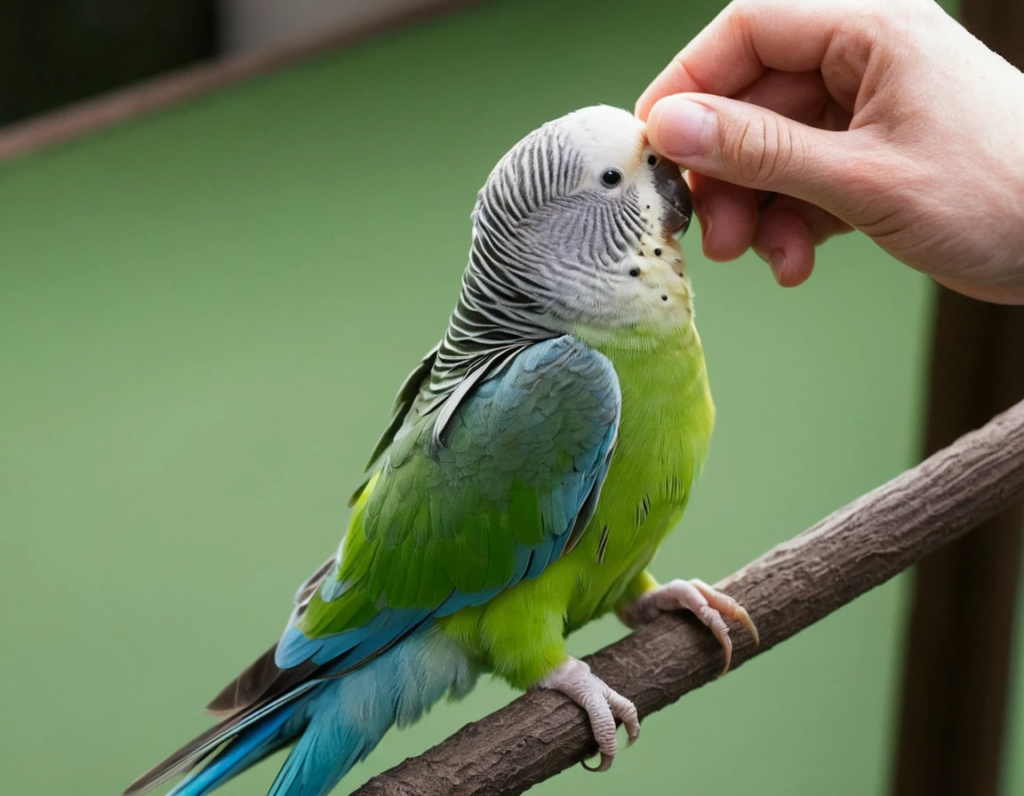
Parakeet Feather Plucking Treatment and Remedies
So, your parakeet has turned into a tiny feather-plucking machine? You’re not alone! Many bird owners wake up to a cage full of feathers, wondering if their bird is planning to go bald on purpose. But don’t worry—there are plenty of natural remedies and treatments to help your feathery friend stop this habit and return to its fluffy, stylish self.
Keep Your Parakeet Busy – No More Boredom!
A bored parakeet is a plucking parakeet. If your bird has nothing fun to do, it might start yanking out its parakeet feather collection just for entertainment.
Remedy:
- Rotate different toys to keep things exciting.
- Provide interactive toys like foraging puzzles.
- Spend time talking and playing with your bird—parakeets love attention!
- Consider getting a second parakeet for companionship.
Reduce Stress – Make Their Life Drama-Free
Parakeets are tiny divas—they don’t handle stress well. A sudden cage move, new pet, or even loud noises can make them anxious and lead to feather plucking.
Remedy:
- Keep their cage in a quiet, stable location.
- Introduce changes gradually—parakeets hate surprises!
- Cover the cage at night for better sleep.
- Play soft music or nature sounds to create a calming atmosphere.
Improve Their Diet – A Well-Fed Bird is a Happy Bird
A poor diet can cause itchy, irritated skin, leading to excessive parakeet feather plucking. If your bird is only eating seeds, it might be missing essential nutrients.
Remedy:
- Add fresh fruits and veggies to their meals (carrots, apples, and leafy greens are great).
- Include high-quality pellets alongside seeds.
- Offer occasional treats like boiled eggs for extra protein.
- Ensure they always have fresh, clean water.
Give Them a Spa Day – Bath Time for Feathery Relaxation
Dry skin can make your parakeet uncomfortable, leading to excessive plucking. A simple bath can do wonders!
Remedy:
- Offer a shallow dish of lukewarm water for your bird to bathe in.
- Lightly mist your parakeet with water if they don’t like bathing.
- Try an aloe-infused spray (natural and vet-approved) to soothe dry skin.
Check for Mites – The Itchy Little Monsters
Mites are sneaky little pests that can irritate your bird’s skin, making them pluck their feathers out of frustration. If your parakeet is plucking excessively and scratching a lot, mites might be the reason.
Remedy:
- Inspect your bird’s skin for redness, tiny black dots, or irritation.
- Clean and disinfect the cage regularly.
- Wash all perches and toys with bird-safe cleaners.
- If mites are suspected, visit an avian vet for natural treatment options.
Visit the Vet – When All Else Fails
If your parakeet feather plucking continues despite trying all these remedies, it might be time to consult a professional. Underlying health issues like infections or hormonal imbalances could be the cause.
Remedy:
- Schedule a vet check-up to rule out medical conditions.
- Follow the vet’s advice on supplements or treatments.
- Keep track of their behavior and any other symptoms.
Final Thoughts – Help Your Parakeet Stay Fluffy!
Stopping parakeet feather plucking takes patience, but with the right approach, your bird can return to its feathery, fabulous self. Keep them entertained, well-fed, and stress-free, and soon, they’ll be back to looking like the proud, colorful parakeet they were meant to be!
Is feather plucking in parakeets a sign of illness?
One day, your parakeet is a fluffy ball of feathers, and the next, it looks like it lost a fight with a feather-duster. If you’re seeing parakeet feather plucking, you might be wondering: Is my bird sick, or is it just having a fashion crisis? The answer isn’t always simple, but let’s break it down.
When Feather Plucking is a Sign of Illness
Feather plucking isn’t always just a quirky habit—it can be a sign of an underlying health issue. Birds can’t tell you when they’re feeling unwell, so sometimes, they show it by overgrooming or plucking their feathers.
Possible Health-Related Causes:
- Skin infections: Bacterial or fungal infections can cause irritation, leading to plucking.
- Parasites (Mites & Lice): These tiny pests make your parakeet feather itchy, driving them to pull out their feathers for relief.
- Allergies: Just like humans, birds can be allergic to dust, certain foods, or even their cage bedding.
- Liver or kidney disease: Internal health issues can sometimes cause discomfort, leading to feather plucking.
- Hormonal Imbalances: When hormones go wild, so does your parakeet’s grooming behavior.
What to Do:
- Check your bird’s skin for redness, sores, or signs of infection.
- Look for other symptoms like lethargy, weight loss, or changes in droppings.
- If you suspect illness, schedule a vet visit—better safe than sorry!
When Feather Plucking is NOT a Sign of Illness
Sometimes, your parakeet is perfectly healthy but just… being a little dramatic. Parakeet feather plucking can also be caused by behavioral or environmental factors.
Common Non-Medical Causes:
- Boredom: A lonely parakeet might pluck just to have something to do.
- Stress: Loud noises, a new pet, or even a recent cage move can stress them out.
- Poor Diet: If they’re living on just seeds, they might be missing key nutrients for healthy feathers.
- Dry Skin: Lack of humidity can make their skin itchy, leading to plucking.
What to Do:
- Provide more toys and interaction to keep them entertained.
- Make sure they have a balanced diet with fruits, veggies, and pellets.
- Offer regular misting or baths to help with dry skin.
- Keep their environment calm and consistent.
How to Tell the Difference
If your parakeet’s feather plucking is paired with other symptoms—like loss of appetite, odd behavior, or changes in droppings—illness could be the culprit. But if your bird acts totally fine otherwise, it might just be a case of boredom or stress.
Quick Checklist:
✅ Still active, eating, and playful? Likely behavioral.
❌ Acting sick, weak, or has skin sores? Time to visit a vet.
Final Thoughts – Keep an Eye on That Parakeet Feather Situation!
Feather plucking in parakeets can be a sign of illness, but it’s not always the case. The key is to observe their behavior and look for other symptoms. If in doubt, a quick check-up with an avian vet never hurts. And remember—your parakeet might just be a little extra, but isn’t that why we love them?
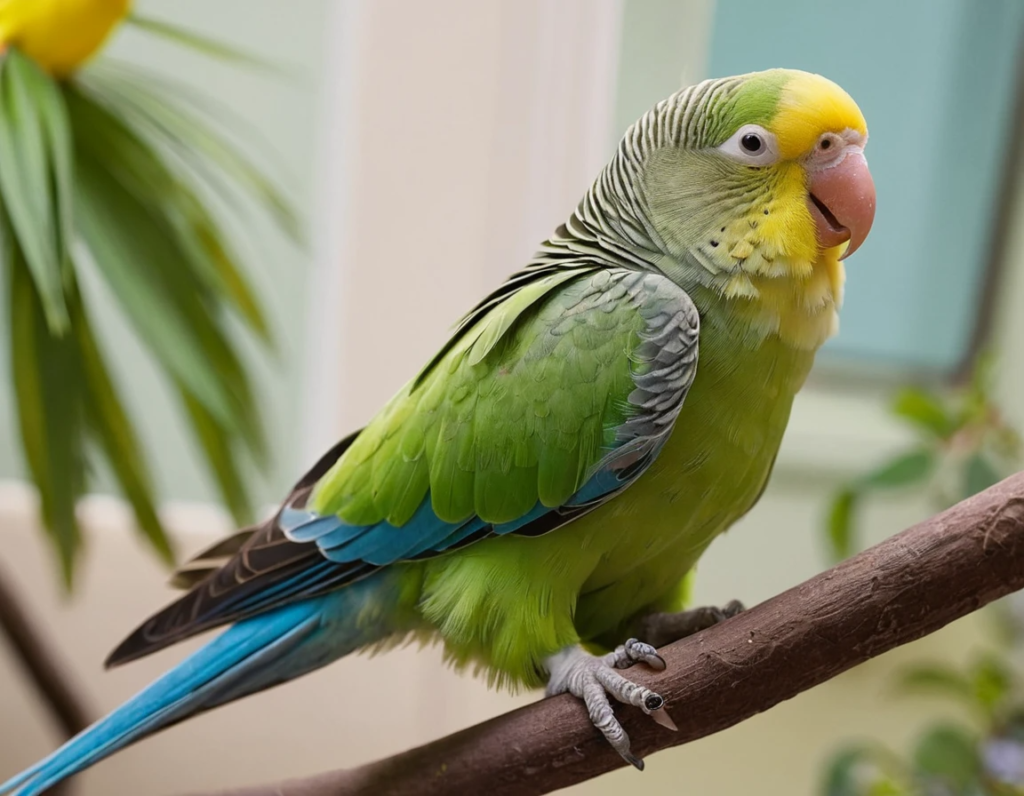
Can stress cause feather plucking in parakeets?
If your parakeet is looking a little less feathery and a lot more patchy, you might be wondering: Is my bird just trying out a new look, or is something wrong? Well, just like humans pull their hair out when stressed (figuratively, we hope), parakeets can pluck their own feathers when they’re feeling anxious. Yes, stress can absolutely lead to parakeet feather plucking, and your little birdie might just be having a meltdown.
Why Does Stress Cause Feather Plucking?
Parakeets are small but sensitive creatures. Even minor changes in their environment can make them nervous. When parakeets feel stressed and don’t know how to cope, they may start plucking their feathers as a way to self-soothe. Think of it as a bad habit, like nail-biting or stress eating—except way more noticeable!
Common Stress Triggers in Parakeets
If your parakeet is stressed and engaging in feather-plucking, it’s time to play detective. Here are some common culprits:
1. Loneliness & Boredom
Parakeets are social birds. If they don’t get enough interaction, they might resort to plucking out their parakeet feather decorations just to pass the time.
Solution: Spend more time with your bird, add a mirror, or consider getting a feathered friend.
2. Sudden Changes in Environment
Did you move their cage? Get a new pet? Change the furniture? Even something as small as a different cage cover can stress them out.
Solution: Keep changes gradual and give them time to adjust.
3. Loud Noises & Chaos
Parakeets don’t appreciate surprise concerts, barking dogs, or loud TVs. Excessive noise can make them anxious and lead to plucking.
Solution: Place their cage in a calm, quiet area and avoid sudden loud sounds.
4. Poor Sleep
Yes, birds need their beauty sleep too! If they’re not getting enough rest, stress levels rise, and suddenly, plucking becomes their new hobby.
Solution: Cover their cage at night and keep their sleep schedule consistent.
5. Lack of Stimulation
A bored parakeet is a destructive parakeet. Without enough mental and physical stimulation, they may turn to feather plucking as a way to entertain themselves.
Solution: Provide new toys, puzzles, and climbing perches to keep them busy.
How to Help a Stressed Parakeet Stop Feather Plucking
Stopping stress-related parakeet feather plucking takes patience, but with the right steps, your bird can get back to looking fabulous.
🦜 Step 1: Identify and Remove Stressors
Figure out what’s stressing your bird and try to eliminate or reduce it.
🎾 Step 2: Increase Interaction & Playtime
Parakeets love company—talk to them, whistle, or let them out for supervised flying time.
🌿 Step 3: Create a Relaxing Environment
Keep their cage in a stable, quiet area with a comfortable temperature. Avoid drastic changes.
🛁 Step 4: Offer Regular Baths
A mist bath or shallow water dish can soothe irritated skin and reduce plucking.
🍏 Step 5: Provide a Balanced Diet
A nutrient-rich diet helps prevent plucking due to nutritional deficiencies. Include fresh veggies, fruits, and pellets.
🏥 Step 6: Visit the Vet if Needed
If the plucking continues despite your best efforts, it’s best to get a vet’s opinion to rule out any medical conditions.
Final Thoughts – Keep Calm & Stay Fluffy!
Yes, stress can cause parakeet feather plucking, but with the right care, your bird can bounce back to its fluffy, happy self. Remember, a calm, engaged, and well-fed parakeet is a pluck-free parakeet! Now go give your bird some love (and maybe a new toy)!
Best Diet to Prevent Feather Plucking in Parakeets
If your parakeet is turning its cage into a feather-covered crime scene, don’t panic! Feather plucking is often linked to diet, and the good news is—you can fix it. Just like humans need a balanced diet to avoid bad hair days, parakeets need proper nutrition to maintain healthy feathers. A poor diet can lead to itchy skin, irritation, and excessive parakeet feather plucking. So, let’s talk about what to feed your bird to keep those beautiful feathers right where they belong!
The Problem with a Seed-Only Diet
Seeds are like junk food for parakeets—delicious but not very nutritious. If your bird is living off nothing but seeds, they might be missing essential vitamins and minerals that keep their feathers strong and healthy.
Why It’s Bad:
- Lacks Vitamin A, which is crucial for skin and feather health.
- High in fat, leading to obesity and poor feather condition.
- Doesn’t provide enough variety for a balanced diet.
So, while seeds should be part of their diet, they definitely shouldn’t be the only thing on the menu.
Fresh Fruits & Veggies – A Must-Have!
If your parakeet feather situation is looking rough, fresh produce might be the missing ingredient. These natural foods provide hydration, vitamins, and antioxidants to keep your bird’s feathers shiny and strong.
Best Fruits for Parakeets:
- Apples (remove seeds)
- Bananas (easy to eat, full of nutrients)
- Berries (rich in antioxidants)
- Oranges (a little vitamin C boost)
Best Veggies for Parakeets:
- Carrots (loaded with Vitamin A)
- Spinach & Kale (packed with iron and calcium)
- Bell Peppers (crunchy and full of vitamin C)
- Broccoli (great for overall health)
Tip: Chop them into small pieces and mix them with their regular food for an easy transition.
High-Quality Pellets – The Perfect Base
If seeds are junk food, pellets are like a well-balanced meal. High-quality bird pellets are designed to give your parakeet all the nutrients they need, helping prevent feather plucking due to deficiencies.
Look for pellets that:
- Are natural and free from artificial colors or preservatives.
- Contain a mix of vitamins and minerals.
- Have a good balance of protein, fiber, and healthy fats.
Switching from seeds to pellets? Mix them together at first, gradually increasing the pellet ratio so your parakeet gets used to them.
Protein Boost – For Strong, Healthy Feathers
Parakeet feather growth needs protein! If your bird isn’t getting enough, their feathers may become weak, leading to excessive plucking.
Best Protein Sources:
- Boiled eggs (a tiny bit, mashed up)
- Cooked quinoa (full of amino acids)
- Sprouted seeds (healthier than dry seeds)
- Mealworms (if your bird is feeling adventurous)
Hydration & Supplements
Dry skin can make parakeets itchy, leading to—you guessed it—feather plucking. Make sure your bird is drinking enough fresh water every day.
Extra Boosters:
- Coconut oil (tiny amount in food) – helps with dry skin.
- Aloe Vera (diluted spray) – soothes irritation.
- Calcium Supplements – for strong bones and feathers.
Final Thoughts – A Happy Parakeet is a Feathery Parakeet!
Preventing parakeet feather plucking starts with the right diet. Give your bird a mix of fresh veggies, fruits, pellets, and protein to keep their feathers healthy and their mood happy. With the right food, your parakeet will be back to looking like the majestic, fluffy creature they were meant to be—no more bald patches!
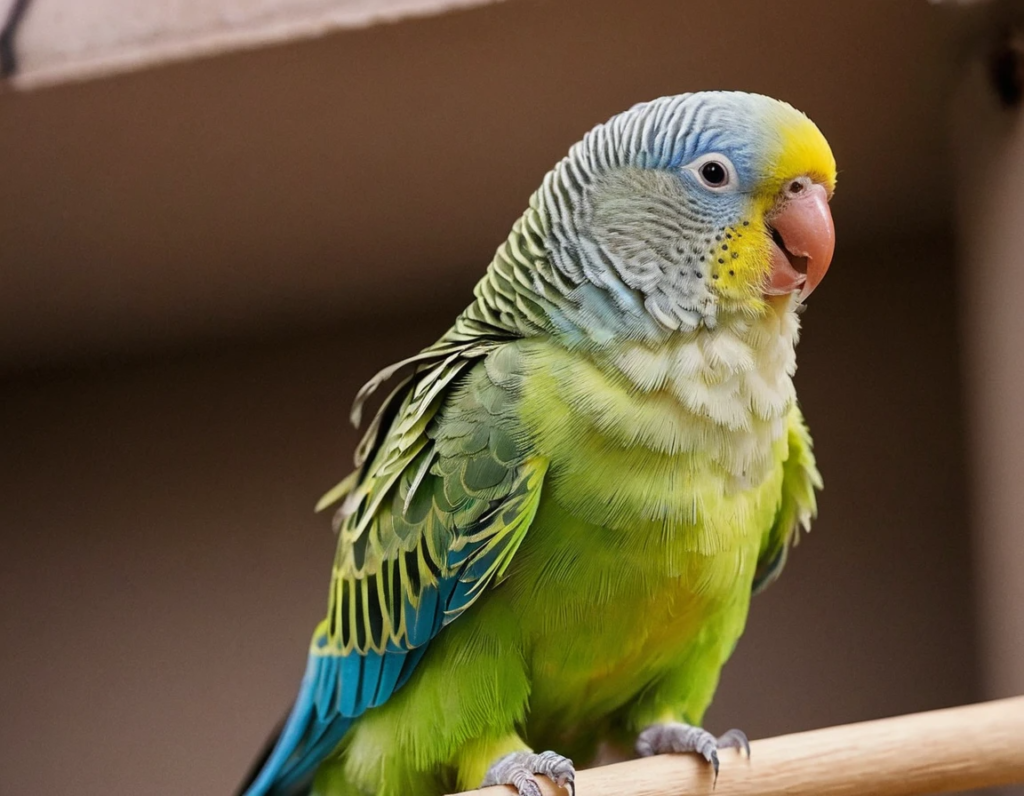
Parakeet Feather Plucking Due to Boredom: Solutions
Ever caught your parakeet yanking out its own feathers like it’s in the middle of a personal crisis? No, your bird isn’t trying to reinvent itself—it’s probably just bored out of its tiny bird brain. Parakeet feather plucking due to boredom is a real issue, but don’t worry, there are plenty of ways to fix it!
Why Do Parakeets Pluck Their Feathers When Bored?
Imagine being stuck in a room with nothing to do all day. No phone, no TV, not even a crossword puzzle. Sounds miserable, right? That’s how a bored parakeet feels. With no entertainment, they might start plucking just to pass the time. It’s like their version of stress-eating, but with fewer snacks and more missing feathers.
Signs That Your Parakeet is Bored
Not sure if boredom is the culprit? Here are some telltale signs:
- Excessive parakeet feather plucking (especially around the chest and wings).
- Repeating the same movements over and over (pacing, head bobbing).
- Screeching or calling more than usual.
- Lack of interest in food, toys, or even you. (Ouch.)
If your bird is showing these signs, it’s time to shake things up!
How to Stop Feather Plucking from Boredom
Upgrade the Toy Collection
Would you be entertained by the same toy for months? Probably not. Your parakeet needs variety!
Best Toys for Parakeets:
- Shreddable toys – Let them destroy something other than their own feathers.
- Mirrors – Because who doesn’t love looking at themselves?
- Foraging toys – Make them work for their treats.
- Swings & ladders – Keep them active and engaged.
💡 Pro Tip: Rotate toys every week so your bird doesn’t get bored.
More Social Time
Parakeets are social creatures. If they’re alone too much, they might start plucking just to have something to do.
- Talk to them – Even if they don’t understand, they love the attention!
- Whistle or sing – It’s like karaoke, but you’re the only one singing.
- Hand-feed treats – A little bonding goes a long way.
- Consider a second parakeet – A feathered friend can make all the difference.
Let Them Fly!
Being stuck in a cage all day is like living in a tiny apartment with no WiFi—frustrating. Letting your parakeet out for safe, supervised flying time can reduce boredom and prevent parakeet feather plucking.
- Close windows and doors.
- Remove hazards (fans, mirrors, open water).
- Let them explore and stretch those wings!
Change the Scenery
Same old cage, same old view? Try these simple changes:
- Move their cage to a different spot in the house.
- Play soft music or nature sounds.
- Give them a window view (but not too much direct sun).
Provide a Healthy Diet
Good nutrition = good feathers. Make sure your parakeet is getting a balanced diet of:
- Pellets (better than just seeds!)
- Fresh fruits & veggies (carrots, apples, spinach)
- Sprouted seeds (a healthier alternative to dry seeds)
Final Thoughts – Keep Your Parakeet Happy & Feathered!
Boredom-induced parakeet feather plucking is preventable! With the right mix of toys, social time, exercise, and diet, your parakeet will be too busy having fun to even think about plucking. So, mix things up, keep them entertained, and watch your bird go from stressed to blessed!
Can Mites or Parasites Cause Feather Plucking in Parakeets?
If your parakeet is scratching like it just heard a bad joke and plucking out its own feathers, you might be dealing with a parasite problem. Yes, mites and other tiny troublemakers can turn your bird’s life (and feathers) into a nightmare. But don’t worry—we’ve got the info you need to help your little buddy stay itch-free and fabulous!
How Do Mites and Parasites Affect Parakeets?
Mites and parasites are basically the uninvited guests that refuse to leave. They irritate your bird’s skin, causing constant itching, discomfort, and—you guessed it—parakeet feather plucking.
Common Culprits:
- Red Mites – These vampires come out at night to suck your bird’s blood. (Yes, it’s as creepy as it sounds.)
- Scaly Face Mites – Attack the beak, legs, and around the eyes, making your bird look like it lost a fight.
- Feather Mites – Love to chew on parakeet feathers, causing bald spots and major discomfort.
- Lice – Tiny but annoying, these pests make your bird super itchy.
Signs That Mites or Parasites Are the Problem
How do you know if mites are the reason behind your parakeet feather loss? Look for these clues:
- Excessive scratching and parakeet feather plucking.
- Bald patches, especially around the wings and tail.
- Restlessness at night (red mites are active after dark).
- Scaly or crusty-looking beak, feet, or face.
- Tiny moving specks on feathers or around the cage. (Ew!)
How to Get Rid of Mites and Parasites
Now that we know the enemy, let’s fight back!
Deep Clean the Cage
Mites love hiding in bedding, perches, and corners. Give the cage a deep clean by:
- Removing all accessories and scrubbing everything with hot water.
- Using a bird-safe disinfectant.
- Replacing old bedding with fresh, clean material.
Treat Your Parakeet
Your bird needs some relief ASAP! You can:
- Use vet-approved mite sprays (always check with your vet first).
- Give them a gentle parakeet feather bath with warm water and aloe vera.
- Apply bird-safe anti-mite powder if recommended by a vet.
Check Other Pets
If you have other birds or animals, mites might have spread. Inspect them too and treat as needed.
Improve Hygiene & Prevention
To prevent mites from coming back:
- Keep your parakeet’s cage clean.
- Avoid overcrowding multiple birds in one cage.
- Quarantine new birds before introducing them.
- Use natural repellents like neem oil (diluted) to keep mites away.
When to See a Vet
If your parakeet’s condition doesn’t improve or gets worse, don’t wait—take them to an avian vet. Sometimes mites cause infections that need medical treatment. A vet can also prescribe medicated sprays or oral treatments to kick mites out for good.
Final Thoughts – Say Goodbye to Mites, Hello to Happy Feathers!
Yes, mites and parasites can cause parakeet feather plucking, but with quick action, your bird can get back to being its fluffy, happy self. Keep their cage clean, check for pests regularly, and give them the care they deserve—because a healthy parakeet is a stylish parakeet!
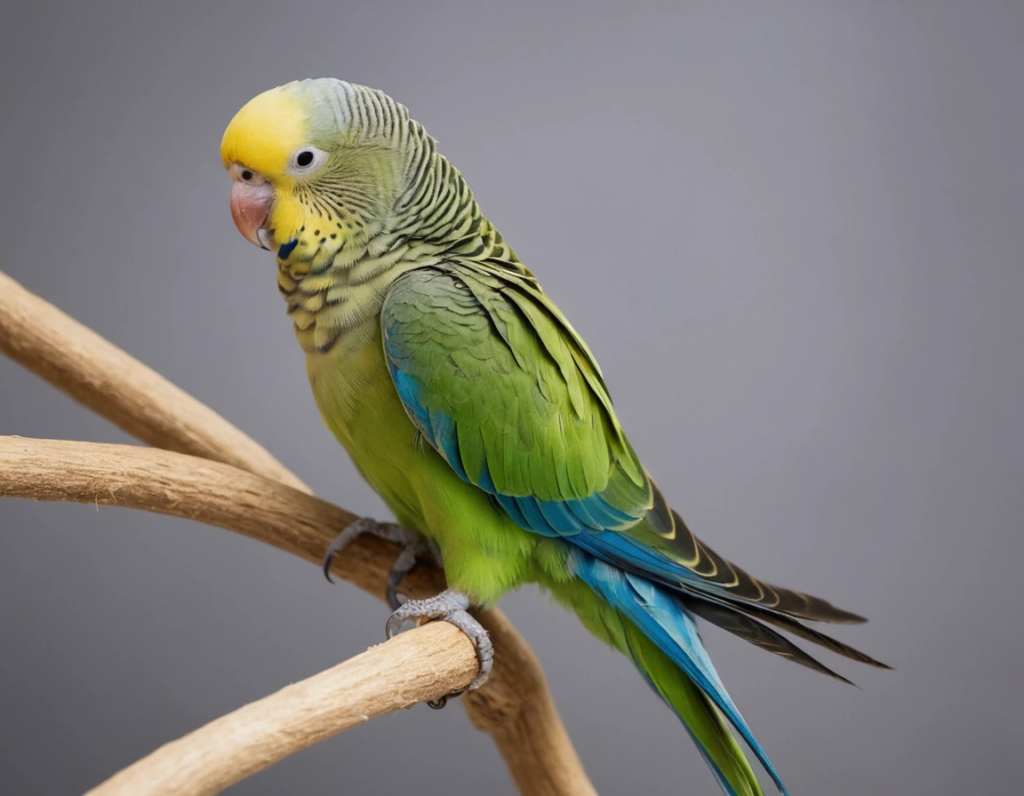
Do feather-plucked parakeets regrow feathers?
If your parakeet looks more like a plucked chicken than a proud, fluffy bird, you’re probably wondering—will those feathers ever grow back? The short answer: most of the time, yes! But, as with anything in life, it depends on a few factors. So, let’s dive into the world of parakeet feather regrowth and find out what you can do to help your bird get back to its feathery glory.
Why Did the Feathers Go Missing in the First Place?
Before we talk about regrowth, let’s address the root cause. Parakeet feather loss can happen due to:
- Self-plucking – Your parakeet might be plucking its own feathers due to stress, boredom, or a bad habit. (Like biting your nails, but much worse.)
- Illness or parasites – Mites, infections, or underlying health problems could be behind the feather loss.
- Molting – A natural process where birds shed old feathers and grow new ones.
- Nutritional deficiencies – A poor diet can lead to weak feathers or delayed regrowth.
If the cause isn’t addressed, regrowth might not happen. So step one: figure out why your parakeet is missing feathers in the first place.
How Long Does It Take for Feathers to Grow Back?
Feather regrowth is like waiting for a bad haircut to grow out—it takes time and patience. On average, new parakeet feather growth can take anywhere from a few weeks to several months, depending on:
- The reason for feather loss.
- The bird’s overall health.
- Proper nutrition and care.
If your parakeet is still plucking or has damaged the feather follicles, regrowth may take longer—or not happen at all. (Yep, sometimes those follicles give up.)
How to Help Your Parakeet Regrow Feathers Faster
While you can’t speed up nature, you can create the perfect environment for feather regrowth. Here’s how:
Fix the Root Cause
If your bird is still plucking, stressed, or sick, the feathers won’t come back. Make sure to:
- Remove stressors (loneliness, loud noises, boredom).
- Treat any mites or infections with a vet’s help.
- Give your parakeet more mental stimulation (toys, social time, music).
Feed Them a Feather-Boosting Diet
Healthy parakeet feather growth starts with good nutrition. Make sure your bird is getting:
- Pellets – More balanced than seeds alone.
- Fresh fruits & veggies – Think carrots, spinach, apples, and bell peppers.
- Protein sources – Boiled eggs, quinoa, or sprouted seeds.
- Omega-3s – Found in flaxseeds and some bird-safe supplements.
Encourage Natural Preening & Bathing
Preening is like a parakeet’s version of a skincare routine—it keeps their feathers in top shape. Help them out by:
- Providing a shallow water dish for baths.
- Misting them with lukewarm water occasionally.
- Offering parakeet feather-safe grooming toys.
Patience, Young Grasshopper
Feather regrowth won’t happen overnight, but with the right care, your parakeet should be back to looking fabulous soon. If months pass with no regrowth, a vet visit is a good idea.
Final Thoughts – Will Your Parakeet Be Fluffy Again?
In most cases, yes! A feather-plucked parakeet can regrow its feathers, but it all depends on what caused the feather loss and whether the follicles are still healthy. With a little care, a good diet, and plenty of entertainment, your parakeet will be back to its fluffy, fabulous self in no time. And if not? Well, bald is beautiful too!
Best Anti-Feather Plucking Sprays for Parakeets
Is your parakeet pulling out its own feathers like it just realized it’s in a horror movie? Feather plucking is a common but frustrating problem for bird owners. The good news? Anti-feather plucking sprays can help! But not all sprays are created equal, so let’s talk about which ones actually work and how to use them properly.
What Are Anti-Feather Plucking Sprays?
These sprays are specially designed to stop parakeet feather plucking by making the feathers taste bitter or soothing irritated skin. Think of it as putting hot sauce on your nails to stop biting them—except, you know, bird-safe.
What to Look for in a Good Spray
Not all sprays are safe or effective. Here’s what you should look for:
- Non-toxic ingredients – Your bird will be licking its feathers, so avoid harmful chemicals.
- Soothing properties – Aloe vera or chamomile can help with irritated skin.
- Bitter taste – Makes parakeet feather plucking less appealing.
- Easy application – Because wrestling with a parakeet is a sport no one signed up for.
Top Anti-Feather Plucking Sprays for Parakeets
Feather-Fix Herbal Spray
🌿 Best for natural soothing
This spray contains aloe vera and chamomile, helping to calm itchy skin and prevent further parakeet feather damage. It’s completely safe and keeps your bird’s feathers soft and shiny.
Bitter Beak No-Pluck Spray
🥴 Best for bad taste deterrent
If your parakeet just has to nibble on something, this bitter spray will make them think twice. It’s bird-safe but tastes awful (to them, not to you—don’t try it).
Avian Care Stop-Pick Formula
💧 Best for mild cases of plucking
This is a gentle mist that conditions parakeet feathers while discouraging plucking. It’s great for birds who are just starting to show signs of feather pulling.
Vet’s Best Feather Guard Spray
🩺 Best for vet-approved care
This spray includes soothing ingredients and a formula that supports healthy feather regrowth. If your parakeet’s plucking is stress-related, this might help them feel more comfortable.
How to Use Anti-Plucking Spray Properly
Spraying your parakeet without traumatizing them takes a little finesse. Here’s how to do it right:
- Hold the spray at least 6 inches away. (No surprise attacks!)
- Mist lightly – You don’t want your bird drenched.
- Avoid the eyes and beak – Unless you want an angry, wet parakeet.
- Be consistent – Use the spray daily until the habit stops.
Final Thoughts – Will a Spray Fix Everything?
While anti-feather plucking sprays can be super helpful, they’re not a magical cure. If your bird is stressed, bored, or sick, those issues need to be addressed first. Combine a good spray with toys, social time, and a healthy diet, and your parakeet will be on its way to a full and fabulous parakeet feather comeback!
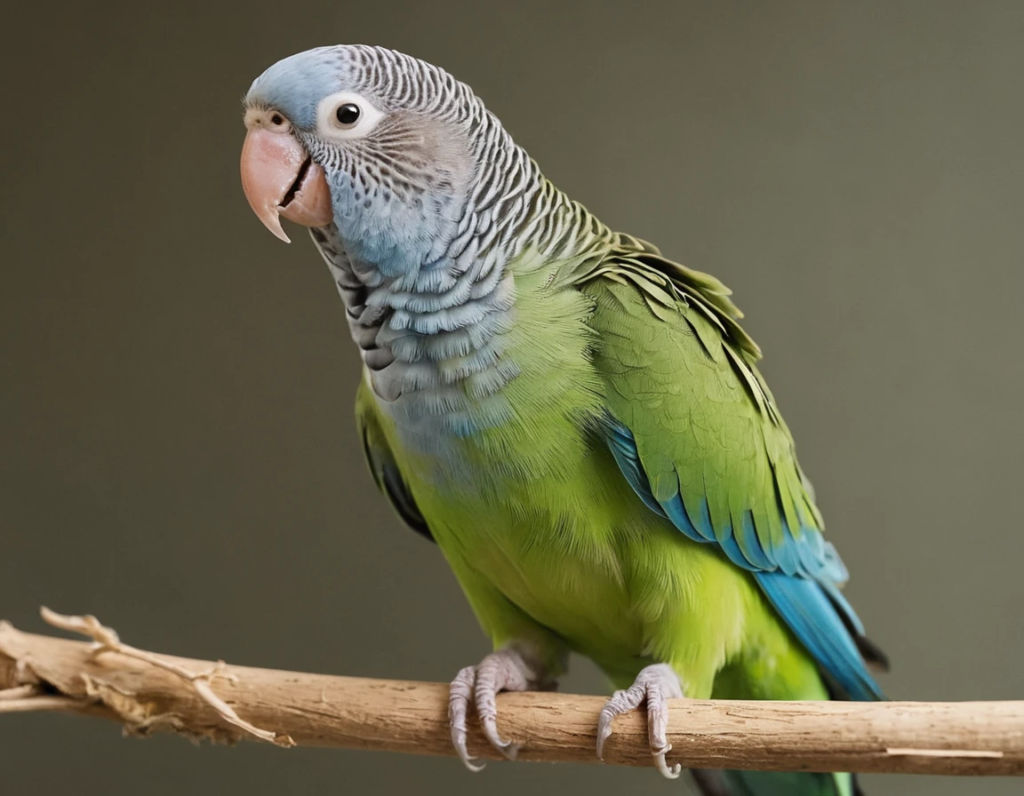
(FAQs) about parakeet feather plucking:
Here are 20 frequently asked questions (FAQs) about parakeet feather plucking, along with their answers:
General Questions
Why is my parakeet plucking its feathers?
- Parakeets pluck their feathers due to stress, boredom, illness, parasites, or nutritional deficiencies.
Is feather plucking normal in parakeets?
- Occasional preening is normal, but excessive plucking is a sign of an underlying problem.
Can feather plucking be stopped?
- Yes! Identifying the cause and providing proper care can help prevent further plucking.
How do I know if my parakeet is over-preening or plucking?
- If your bird has bald spots, excessive feather loss, or seems stressed while preening, it’s likely plucking.
At what age do parakeets start feather plucking?
- There’s no set age, but it often starts when they experience stress or health issues.
Health-Related Questions
Can mites cause feather plucking in parakeets?
- Yes, mites and other parasites can irritate the skin, causing itching and plucking.
Is feather plucking in parakeets a sign of illness?
- Sometimes. If plucking is accompanied by weight loss, lethargy, or other symptoms, a vet visit is necessary.
Will a change in diet help with feather plucking?
- Yes! A balanced diet with fresh fruits, vegetables, and protein supports healthy feathers.
Can allergies cause feather plucking?
- Yes, parakeets can be allergic to dust, pollen, or chemicals in cleaning products.
Do parakeets pluck feathers due to pain?
- Pain from infections, injuries, or internal issues can trigger plucking as a response.
Behavioral Questions
1. Can stress cause my parakeet to pluck its feathers?
- Absolutely! Changes in environment, loud noises, or loneliness can lead to stress-induced plucking.
2. Do bored parakeets pluck their feathers?
- Yes, lack of stimulation can make them resort to plucking as a form of entertainment.
3. Will another parakeet help stop feather plucking?
- Sometimes, but not always. If loneliness is the issue, a companion might help. However, territorial disputes could make things worse.
4. Can feather plucking be a habit even after the cause is gone?
- Yes, some birds develop a compulsive plucking habit that continues even after the initial trigger is removed.
5. Can too much petting cause feather plucking?
- Overhandling can sometimes overstimulate or irritate a bird, leading to plucking.
Treatment and Prevention Questions
1. Do anti-feather plucking sprays work?
- They can help discourage plucking by making feathers taste bitter, but they should be used alongside other solutions.
2. Will my parakeet’s feathers grow back after plucking?
- In most cases, yes! However, if the feather follicles are damaged, they may not regrow.
3. How can I prevent feather plucking in my parakeet?
- Provide a stimulating environment, a healthy diet, social interaction, and regular vet checkups.
4. Should I take my parakeet to the vet for feather plucking?
- If the plucking is severe, persistent, or accompanied by other symptoms, a vet visit is highly recommended.
5. Can toys help stop feather plucking?
- Yes! Chew toys, foraging activities, and interactive playthings can keep your parakeet busy and reduce plucking behavior.

